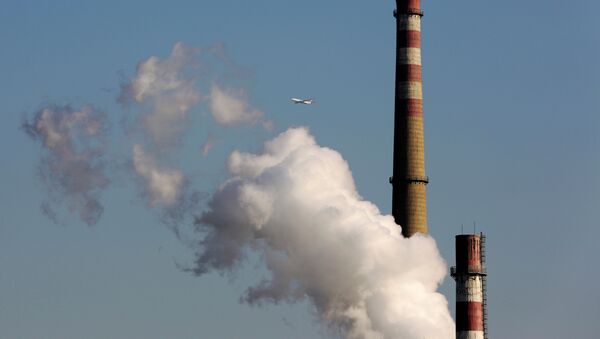MOSCOW (Sputnik) — Last week, US President Donald Trump signed an executive order aimed at rolling back a number of Barack Obama administration's climate policies, including launching the process of abolishment of the Clean Power Plan, an initiative to reduce carbon pollution from power plants.
"The Clean Power Plan will have some impact, because it’s the domestic regulation of carbon, but from our perspective it doesn’t really have a negative impact at this point on renewables investment … Many [US] states that are dominated by Republican legislators and governors are making a lot of money from renewable energy, so I think the business case will continue to carry renewables, I think renewables will continue to contribute to the decarbonisation of the US economy and that will be the case for the coming few years," Amin said in an interview.
He also expressed doubts that the United States would withdraw from the Paris agreement on climate change.
"You wonder if it’s worth the effort to make an issue about Paris right now, because what he [Trump] is trying to do is work on domestic regulations," Amin said.
In August 2015, former US President Barack Obama unveiled the Clean Power Plan, the first national carbon pollution standards for power plants in the US history. The initiative came within the 2015 Paris climate deal, which aims to limit global average temperatures to less than 2 degrees Celsius above pre-industrial level.
On October 5, 2016, Obama formally ratified the Paris climate deal, capping his presidency-long environmental legacy.
IRENA Chief Praises Russia’s Positive Role in Energy, Commitment to Paris Climate Deal
Russia has used its influence in the energy market positively despite its oil and gas-reliant economy, remaining committed to the implementation of the Paris deal on fighting climate change and contributing to clean energy, Amin told Sputnik.
"Russia is playing a very positive role is that it is oil and gas economy, but it is committed to its promise in Paris to the climate agreement, Russia is not backing off, Russia is taking that commitment seriously and is looking forward to how it can contribute to different possibilities, including clean energy," Amin said.
He noted that Russia, being one of the biggest energy economies, was influencing other sectors as well.
"Oil and gas and Russian energy exports determine a lot of the trade patterns and political relationships around the world, so it’s very influential in the field of energy, it’s very influential in other fields also. I think it’s positive," the IRENA chief said.
Despite its oil and gas driven economy, the country played a major part in reaching the agreement of oil producers to limit their oil output, pledging to cut some 300,000 barrels daily of the total oil production starting January for six months to stabilize the energy market.
The Paris Agreement entered into force on November 4, 2016, ratified by 111 countries. Russia signed the agreement on April 22 but has not yet ratified it. The ratification is expected to take place after 2020.


